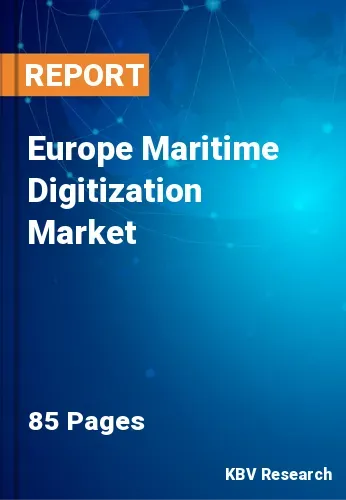The Europe Maritime Digitization Market would witness market growth of 9.1% CAGR during the forecast period (2022-2028).
The widespread use of the internet, advancements in digital technology, and satellite communications have made multimodal maritime logistics networks transparent and connected. This is a crucial component of success for many businesses in the manufacturing and service sectors. Digital technologies have advanced into IT delivery models, pervasive computing (for example, IoT), mobile computing, blockchain, digital twins, robotics, virtual augmented & mixed reality, real-time data & related tools (for example big data), autonomous vessels & vehicles in ports.
For the past 20 years, merchant ships have already been outfitted with sensors that continuously update position, speed, and direction. This offers a hugely beneficial source for big data-based predictive analytics, which in turn provides information on the status of the supply chain. In addition, the technologies cater to various needs of various maritime logistics sector areas. IoT, for instance, enables the monitoring of every cargo management and activity within logistics centers to act quickly to address accidents or bottlenecks.
One of the major ports in Europe, the Port of Rotterdam is reputed to have the finest port infrastructure globally. This is due to the port authority's early decision to digitize operations and concentrate on accomplishing sustainable development objectives like paperless trade, etc. These procedures result in substantial cost reductions and increased operational effectiveness. Moreover, the Netherlands is regarded as the first country on the planet to have created an automated terminal without a human operator and a crane quay without a human operator. The Port of Rotterdam continues to be the center of European maritime trade and aspires to serve as a focal point for Industry 4.0 in the region. Therefore, in the coming years, the region presents enormous growth potential for the advancement of the maritime digitization market.
The Germany market dominated the Europe Maritime Digitization Market by Country in 2021, and would continue to be a dominant market till 2028; thereby, achieving a market value of $18,265.9 Million by 2028. The UK market is anticipated to grow at a CAGR of 8.2% during (2022 - 2028). Additionally, The France market would exhibit a CAGR of 10% during (2022 - 2028).
Based on Application, the market is segmented into Fleet Management, Vessel Management, Inventory Management, Energy Management, and Predictive Maintenance. Based on End User, the market is segmented into Ports & Terminals, Shipping Companies, and Maritime Freight Forwarders. Based on Technology, the market is segmented into IoT, AI, Blockchain, and Others. Based on countries, the market is segmented into Germany, UK, France, Russia, Spain, Italy, and Rest of Europe.
Free Valuable Insights: The Global Maritime Digitization Market will Hit $266.5 Billion by 2028, at a CAGR of 9.4%
The market research report covers the analysis of key stake holders of the market. Key companies profiled in the report include Windward Ltd., Inmarsat Global Limited (Connect Bidco Limited), Lockheed Martin Corporation, Spire Global, Inc., Iridium Communications Inc., Orbcomm, Inc. (GI Partners L.P.), MariApps Marine Solutions Pte Ltds (Schulte Group), Marine Solutionz Ship Management Pvt. Ltd., xyzt.ai BV, and Perle Systems Inc.
By Application
By End User
By Technology
By Country

Our team of dedicated experts can provide you with attractive expansion opportunities for your business.

